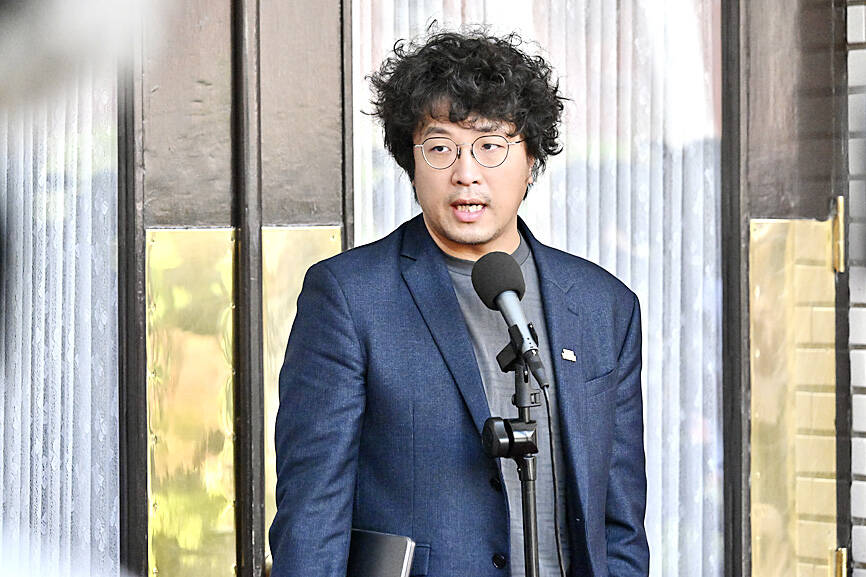A Chinese Nationalist Party (KMT) proposal to allow Chinese investment in Taiwan’s outlying islands would open the door for Chinese infiltration, Democratic Progressive Party (DPP) Legislator Puma Shen (沈伯洋) said on Tuesday.
KMT Legislator Chen Hsueh-sheng (陳雪生) proposed amendments to the Offshore Islands Development Act (離島建設條例) that would allow Chinese manufacturers to participate in industrial development and public construction projects on outlying islands.
The amendments would also open enrollment at colleges and universities on outlying islands to Chinese students, and exempt them from enrollment quota restrictions.

Photo: George Tsorng, Taipei Times
The proposals would “open four doors” to Chinese infiltration, Shen wrote on Facebook.
The first door would allow Chinese companies’ involvement in public infrastructure projects, and exclude them from normal restrictions, he said.
That would weaken Taiwan’s sovereignty and endanger national security by bypassing Article 17 of the Government Procurement Act (政府採購法), as well as provisions in Article 40 of the Act Governing Relations Between the People of the Taiwan Area and the Mainland Area (台灣地區與大陸地區人民關係條例), he said.
The second door would allow Chinese companies used for such procurements to send people to the islands, without being subject to normal rules on Chinese working in Taiwan, he said.
The amendments would also bypass rules stipulating that those coming to Taiwan from China for such projects not be allowed to change jobs within one year, he added.
The third door would permit workers and equipment from Chinese manufacturers to be brought into restricted areas, Shen said.
The fourth door is a clause in the proposals that would make the stipulations also applicable to Taiwanese companies, meaning that firms colluding with Beijing could bring in Chinese workers and equipment to the outlying islands, he said.
The national security implications of the proposals would be worse than those of the Cross-Strait Service Trade Agreement, the passage of which led to the 2014 Sunflower movement, DPP Legislator Huang Jie (黃捷) said.
If passed, the proposal would open up all areas of Taiwan’s outlying islands to Chinese spies, Huang said.
“It is being touted as a way to improve the efficiency of infrastructure projects, but in effect, it would open up a back door to China,” she said.
Under current regulations, manufacturers from foreign countries can only bid on public projects if there is a bilateral agreement signed by that country and Taiwan, she said.
Even then, if the project has national security implications, restrictions might be placed on the foreign company, she said.
As China and Taiwan have no such agreement, government tenders must be decided on a case-by-case basis, she added.
Speaking with reporters yesterday, Chen said that the outlying islands are unable to complete infrastructure problems due to a labor shortage.
“The ruling party is unable to solve that labor shortage. Instead of being so pessimistic, people should try to help solve the issue,” he said. “If you want to recall me, go ahead and do so.”
Asked whether the proposal would “open a back door” for China, Chen said that allowing Chinese tourists to visit Taiwan was “already opening the door to China.”

The brilliant blue waters, thick foliage and bucolic atmosphere on this seemingly idyllic archipelago deep in the Pacific Ocean belie the key role it now plays in a titanic geopolitical struggle. Palau is again on the front line as China, and the US and its allies prepare their forces in an intensifying contest for control over the Asia-Pacific region. The democratic nation of just 17,000 people hosts US-controlled airstrips and soon-to-be-completed radar installations that the US military describes as “critical” to monitoring vast swathes of water and airspace. It is also a key piece of the second island chain, a string of

A magnitude 5.9 earthquake that struck about 33km off the coast of Hualien City was the "main shock" in a series of quakes in the area, with aftershocks expected over the next three days, the Central Weather Administration (CWA) said yesterday. Prior to the magnitude 5.9 quake shaking most of Taiwan at 6:53pm yesterday, six other earthquakes stronger than a magnitude of 4, starting with a magnitude 5.5 quake at 6:09pm, occurred in the area. CWA Seismological Center Director Wu Chien-fu (吳健富) confirmed that the quakes were all part of the same series and that the magnitude 5.5 temblor was

The Central Weather Administration has issued a heat alert for southeastern Taiwan, warning of temperatures as high as 36°C today, while alerting some coastal areas of strong winds later in the day. Kaohsiung’s Neimen District (內門) and Pingtung County’s Neipu Township (內埔) are under an orange heat alert, which warns of temperatures as high as 36°C for three consecutive days, the CWA said, citing southwest winds. The heat would also extend to Tainan’s Nansi (楠西) and Yujing (玉井) districts, as well as Pingtung’s Gaoshu (高樹), Yanpu (鹽埔) and Majia (瑪家) townships, it said, forecasting highs of up to 36°C in those areas

IN FULL SWING: Recall drives against lawmakers in Hualien, Taoyuan and Hsinchu have reached the second-stage threshold, the campaigners said Campaigners in a recall petition against Chinese Nationalist Party (KMT) Legislator Yen Kuan-heng (顏寬恒) in Taichung yesterday said their signature target is within sight, and that they need a big push to collect about 500 more signatures from locals to reach the second-stage threshold. Recall campaigns against KMT lawmakers Johnny Chiang (江啟臣), Yang Chiung-ying (楊瓊瓔) and Lo Ting-wei (羅廷瑋) are also close to the 10 percent threshold, and campaigners are mounting a final push this week. They need about 800 signatures against Chiang and about 2,000 against Yang. Campaigners seeking to recall Lo said they had reached the threshold figure over the